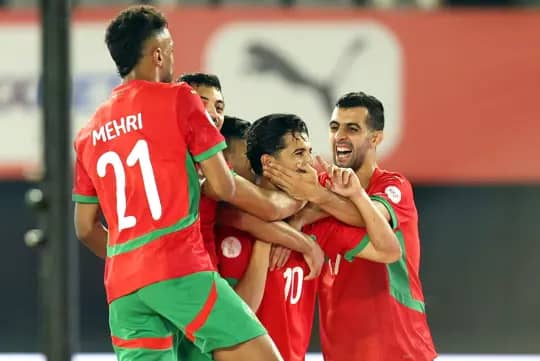On a tense Kampala night, the contest that defined the CHAN 2024 semi-finals came down to nerve, detail, and the thud of a penalty off the crossbar. Morocco, twice champions, outlasted Senegal 5-3 in a shootout after a 1-1 draw through extra time at the Nelson Mandela National Stadium, booking a date with Madagascar in Nairobi and ending the holders’ dream of defending their crown.
The goals that set the tone
Senegal began with assurance and bite, and they were rewarded in the 16th minute when Joseph Layousse met Libasse Guèye’s corner with a commanding header for 1-0. It felt like a statement from a youthful side that has prized structure and belief, a reminder that champions never fade quietly and that their set-piece precision could tilt a balanced semi-final.
Morocco replied with a stunner seven minutes later, Sabir Bougrine stepping into space and sending a long-range strike screaming into the top corner for 1-1. In that moment, the Atlas Lions’ pedigree resurfaced, a flash of individual brilliance serving a collective that has made a habit of mastering tournament pressure.
The tactical pendulum
The match evolved into a duel of approaches, Senegal pressing their advantage on dead balls, Morocco taking more control of the ball and seeking passing lanes to unbalance a disciplined back line. Chances came for both sides, Layousse narrowly missing again and Anas Bach denied by goalkeeper Marc Diouf, each moment a small tug on a momentum rope that refused to settle.
As the second half tightened, Morocco’s composure in circulation met Senegal’s readiness to pounce on transitions and set plays. The contrast was striking, one team leaning on tournament experience and the other on youthful conviction, each convinced that patience and detail would decide the night.
Goalkeepers as protagonists
In a semi-final that demanded bravery, the goalkeepers kept the story alive. El Mehdi Al Harrar produced vital interventions to keep Morocco level, notably against Layousse and Seyni Ndiaye, while Diouf answered with authority at the other end. Their presence turned half-chances into regrets and separated potential heroes from the fine print of extra time.
Diouf, who had been outstanding in earlier rounds, carried himself with the same calm, smothering a Bach effort and refusing to yield when Youssef Mehri probed from midfield. Every strong hand and smart angle added tension to a game increasingly defined by inches and instincts.
Extra time on a knife edge
Fatigue layered over the semi-final like a curtain, but concentration never flickered. Morocco’s Oussama Lamlaoui rose late and forced Diouf into a fingertip save in the 119th minute, a near decider that spoke to Lamlaoui’s tournament form and timing. Seconds earlier, Bonaventure Fonseca had gone just over for Senegal, a mirror of the thin margins that framed the night.
By the end of 120 minutes, the match felt destined for penalties, the kind of conclusion that can be both cruel and clarifying. With neither side able to punch through, a cerebral contest gave way to a test of psychology, routine, and courage.
The shootout and the weight of a first kick
Morocco’s takers were impeccable in the shootout, a sequence of strikes that spoke to training-ground repetition and a shared calm. Hrimat, Lamlaoui, Khairi, Bach, then Mehri converted with the authority of a team that embraces pressure, each step a quiet nod to experience in tight tournaments.
Senegal blinked first when captain Seyni Ndiaye crashed their opening penalty off the crossbar, a single moment that tilted the frame and forced the holders to chase. Vieux Cissé, Baye Ciss, and Daouda Ba found the net, but the first miss lingered, a reminder that in shootouts the beginning can matter as much as the end.
Experience meets youth and the story behind the score
The semi-final had been cast as a meeting of philosophies, Morocco’s pedigree against Senegal’s renewal, and the ninety plus thirty minutes followed that script with honesty. Morocco leaned on structure, game management, and an ability to ride out turbulence, while Senegal showcased the discipline and energy that powered a youthful squad into the last four.
There was respect in every duel and promise in every sprint, a sense that African football is richer when both continuity and reinvention share the stage. The scoreboard rendered a verdict, but the performance from the holders validated a project built on local talent and clear identity.
Voices from the touchline
It was a tough match against the defending champions, but the players showed composure in the key moments. We have fought hard to reach this stage, and now we want to win the trophy again.
Coach Tarik Sektioui’s message echoed the tone of Morocco’s night, a mixture of humility and ambition, the kind of balance that travels well into finals. It captured a group that knows how to absorb pressure and seize the small windows that decide tournaments.
This is a young generation writing its first chapter. They played with courage and discipline. Penalties are always cruel, but our future remains bright.
Souleymane Diallo’s words fit the reality of Senegal’s campaign, a journey powered by belief in youth and a defensive steel that had carried them through tight margins. The ending hurt, but the outline of tomorrow looked strong and unshaken.
Turning points that shaped Kampala
- Layousse’s early header from a Guèye corner, a moment that underlined Senegal’s set-piece threat,
- Bougrine’s thunderbolt from distance that restored parity and shifted the emotional tide,
- Ndiaye’s penalty off the crossbar, the miss that framed a flawless Moroccan shootout.
Numbers that tell the tale
Morocco advanced to a third CHAN final in six years, a run that reflects continuity and a culture of high-level readiness. They seek a third crown after lifting the title in 2018 and 2020, a pursuit that now flows into a Saturday final in Nairobi against Madagascar.
Senegal’s path to the last four highlighted defensive resilience, a measured approach that had seen them concede only once before this semi-final. With the third-place playoff ahead in Dar es Salaam against Sudan, there remains competitive value and a chance to close the tournament with a victory.
The road to Nairobi and what comes next
Madagascar, the surprise package, awaits Morocco at Moi Sports Centre Kasarani, a final that pairs the tournament’s seasoned operators with a debutant writing a gripping story. If the Atlas Lions bring the same clarity and patience, their search for a third title will rest on familiar pillars, control in midfield and conviction at the decisive moments.
For Senegal, the next assignment arrives quickly, a third-place meeting with Sudan in Dar es Salaam. The sides already played to a goalless draw in the group stage, a reminder that focus and set-piece sharpness will again be central if Diallo’s group is to sign off with authority.
Why the semi-final mattered beyond the score
Results form the public memory, but performances reveal the state of a project. Morocco’s consistency across co-host venues in Tanzania, Kenya, and Uganda underscored their adaptability and attention to detail. That culture helps transform difficult nights into manageable challenges, especially in knockout football.
Senegal’s tournament reinforced the value of trust in domestic pathways, a model that can sharpen identity and widen opportunity. Even in defeat, their structure held, their goalkeeper inspired confidence, and their approach suggested sustainability, all of which matters for the future.
Key characters who defined the rhythm
Joseph Layousse gave Senegal a platform with his aerial dominance, a performance that constantly asked Morocco to reorganize their defensive matchups. His presence on set pieces was a theme, a recurring question that demanded precise answers in the box.
Sabir Bougrine’s strike was more than an equaliser, it was a spark that reintroduced Morocco’s ability to decide games from distance and from moments of individual quality. In a match of fine margins, his timing and technique mattered as much as any pattern of play.
El Mehdi Al Harrar and Marc Diouf shared the spotlight as guardians of fragile scorelines, each save a turning page in a narrative that refused to end before penalties. Their interventions kept both stories alive, and in another version of this night, one of their late stops is the headline.
The psychology of penalties
In shootouts, routines meet emotions, and first impressions matter. The opening miss by Senegal’s captain set a tone that Morocco never allowed to change, a subtle example of how a single moment can compress the whole contest into a few strides and a swing of a boot.
Morocco’s perfect sequence of five reinforced the idea that repetition and shared standards can travel under pressure. When Hrimat began with certainty and Mehri finished with the same, the Atlas Lions looked like a team that had rehearsed not just the kicks, but the calm between them.
What this says about the tournament arc
CHAN 2024 has celebrated both experience and discovery, and this semi-final captured that balance. Morocco’s seasoned edge held up under stress, while Senegal’s youthful core showed enough quality to hint at a return to these stages in the near term.
The final in Nairobi now offers a fresh contrast, a two-time champion eyeing a third title against a rising force that has already upset expectations. The storyline is compelling, and the stakes could not be clearer for a competition that thrives on identity and opportunity.
Closing thought
The scoreboard will record Morocco 1-1 Senegal after extra time, Morocco win 5-3 on penalties, but the memory of Kampala is richer than the digits. It is a picture of resolve, of a captain’s miss that changed the wind, of a goalkeeper’s fingertips in the 119th minute, and of a champion that understands how to survive nights that test the mind as much as the legs.
Now the Atlas Lions move to Nairobi with purpose, and Senegal head to Dar es Salaam with pride intact and lessons gathered. The semi-final gave us both a result and a reminder, that in tournament football, character is often the quietest, and most decisive, statistic.





